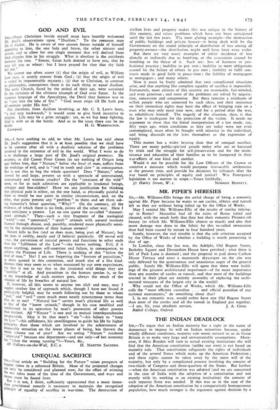UNEQUAL SACRIFICE , S _ 111, 7 - Your article on "Building for the Future "
raises prospects of happier times in a reformed Britain. Most of the projected changes can only be considered and planned now, for the effort of winning the War takes most of the time of the Government, and ways and means must be found later.
But it is not, I think, sufficiently appreciated that a more imme- diate Provisional remedy is necessary to maintain the recognised Pfinciple of equality of sacrifice in war-time. The destruction of civilian lives and property makes this war unique in the history of this country, and raises problems which have not been anticipated until the last few years. The most glaring example—the destruction of public buildings and private houses—is being dealt with by the Government on the sound principle of distribution of loss among all property-owners—the distribution might well have been even wider.
But there are very many examples of unfair incidence of loss directly or indirectly due to bombing, or the evacuation caused by bombing or the threat of it. Such are: loss of business or pro- fessional practice ; inability to pay rent ; inability to meet obligations caused by the failure of others to pay rent ; inability to fulfil con- tracts made in good faith in peace-time ; the liability of mortgagors to mortgagees ; and many others.
Now it must be freely admitted that very complicated situations arise, and that anything like complete equality of sacrifice is impossible. Fortunately, most citizens of this country are reasonable, fair-minded, and even generous ; and most of the problems are solved by negotia- tion, concession and compromise. But there remains a residuum of selfish people who are unmoved by such ideas, and their insistence on their immediate rights may have the effect of bringing ruin on a man who may only need time now, and for a period after the war, to rehabilitate himself. The tragedy of the situation, then, is that the law is inadequate for the protection of the victim. It needs no argument to show that the literal interpretation of a law made, say, fifty years ago, when conditions as they are today were not even contemplated, must often be fraught with injustice to the individual, and bring discredit on the laws themselves as the expression of equity.
This matter has a wider bearing than that of unequal sacrifice. There are many public-spirited people today who are so harassed by trials and the struggle for self-preservation and for the main- tenance and education of their families as to be hampered in their war-efforts of one kind and another.
Would it not be possible for the Law Officers of the Crown to contrive a measure which would postpone irrevocable settlements at the present time, and provide for decisions by tribunals after the war based on principles of equity and justice? War Emergency legislation is too narrow in scope.—Yours faithfully,






























 Previous page
Previous page